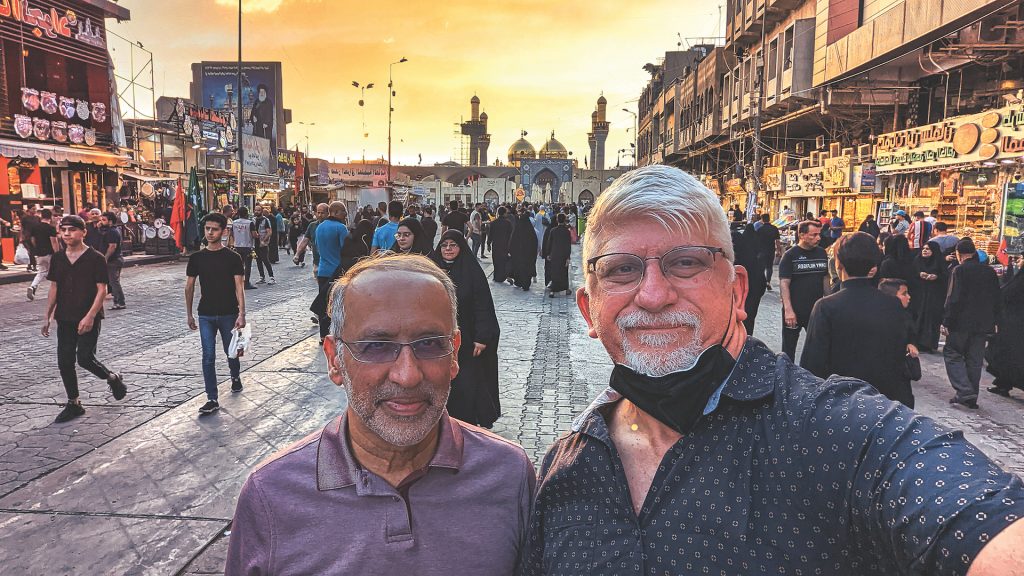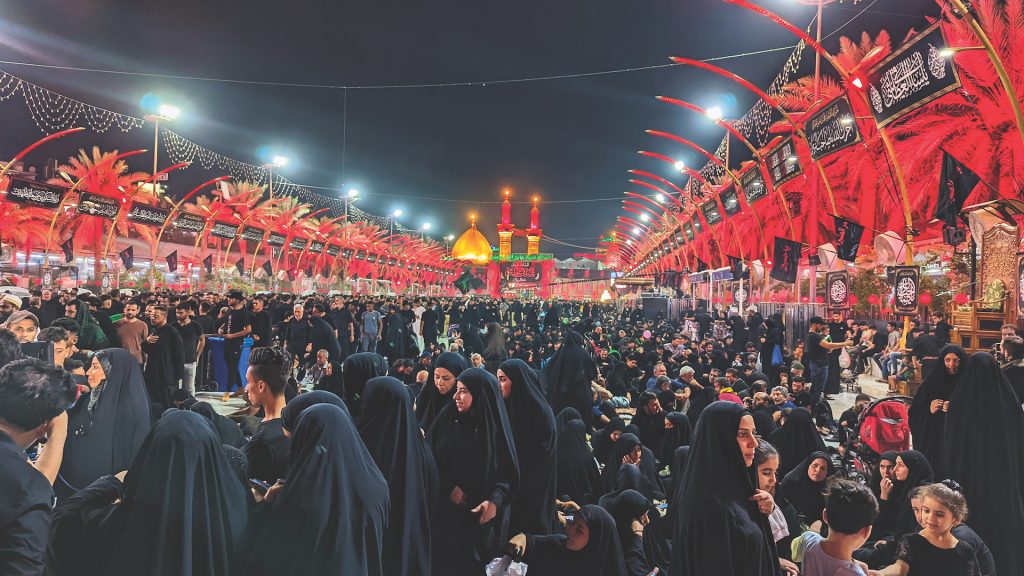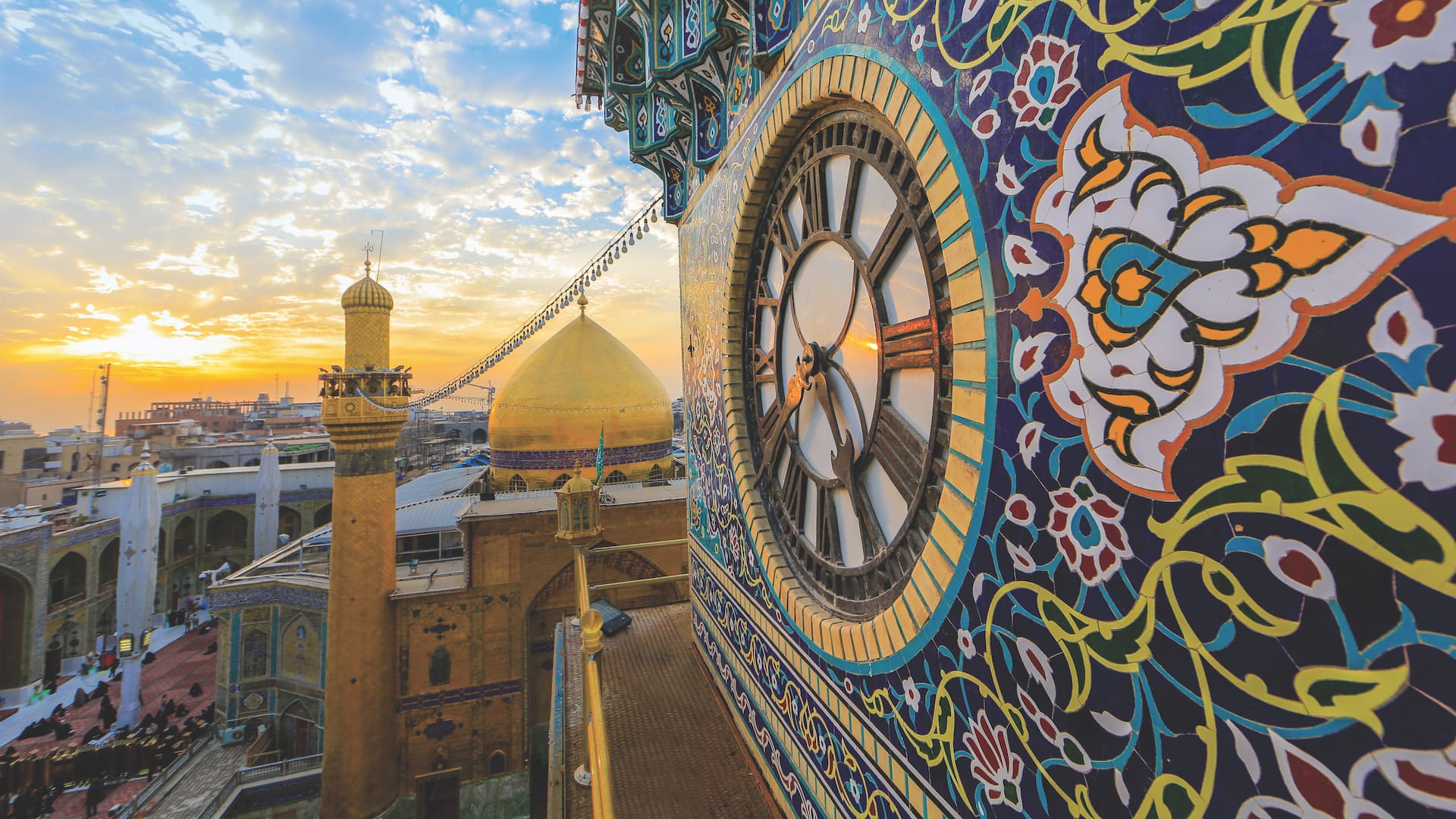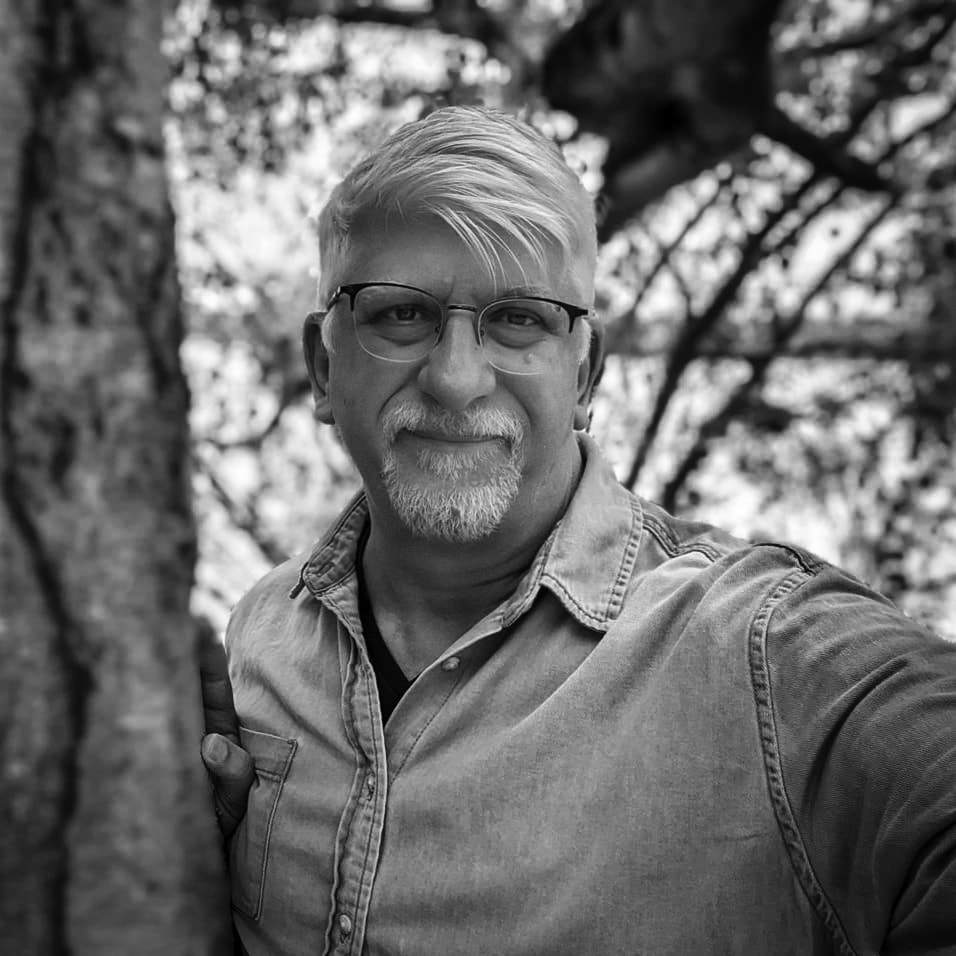The shrine of Imam Ali Ibn Abi Talib in Najaf, Karbala, Iraq
ENGAGING WITH OUR RELIGIOUS “OTHER”
It was approaching 120 degrees in the city of Najaf in southern Iraq. I emptied a packet of electrolytes into my water bottle, hoping to fortify myself against dehydration in the desert.
It was the same desert Abraham called home before he started his journey to the Promised Land. I was on my own spiritual pilgrimage with Muslim friends.
My initial steps on this path began back when I was a pastor in the Seattle area right after 9/11. In an effort to understand and love our Muslim neighbors, I began to visit local mosques and make friends in the Muslim community. I’ve been doing that ever since. On this visit I joined a group of Muslims doing the Ashura. In the Shia tradition, this is a high holy moment of pilgrimage to the shrines of important leaders from the past, and a time of lament specifically for the martyrdom of Imam Hussein in 680 CE. His tomb is one of the holiest sites in Shia Islam.
One day in the middle of the 12-day pilgrimage, we paused for a visit with the Ali al-Husayni al-Sistani.
Sistani is the spiritual leader of Shia Muslims. He played a key role in the political proceedings that followed the US-led invasion of Iraq in 2003, and he was an important participant in planning Iraq’s first democratic government.
It would be easy for an American to stereotype him. He is a cleric with a long beard who wears a turban. Some clerics have said inflammatory things in the past about US foreign policy in the region.
But so have I.
Sistani’s audiences have included Pope Francis and the Secretary-General of the United Nations. It was remarkable that we were able to meet with him, that as a citizen of the US, I would be received with genuine hospitality and offered tea.
Sistani lives in a modest home in Najaf, where we took refuge from the blistering heat for conversation together. I was impressed by his humility.
Muslim members in our group made petitions to him for good health and God’s blessing in their lives. And one asked him, “What is the greatest lesson you’ve learned from your life’s experiences?”
The group was silent, suspended in anticipation of his answer. What would he say he had learned from his 92 years of life, after 17 years of conflict in his country and witnessing some of the most brutal acts of violence in the land known as “the fertile crescent”?
Sistani pondered for a minute. In response he mentioned three things: Be good to all people as they are your siblings in faith or equals in humanity. Help those you encounter in whatever capacity you can. Cultivate good character in your interactions with others, even
if they do not reciprocate.
As his aides began to usher us out of his presence, our group’s leader, Dr. Liyakat Takim, turned to me and said, “Reverend, that sounds a lot like Jesus Christ.”
Indeed.
As we headed for the exit, one of Sistani’s handlers pulled me aside, recognizing me as an outlier in this group of Muslim pilgrims. He asked me several questions. Who was I? Why did I come to Iraq? Acting as translator, Dr. Takim, who is the Sharjah chair in global Islam at McMaster University in Hamilton, Ontario, explained that I was a Christian brother who was there to learn and pay my respects.
A member of Sistani’s staff reached for my hand in a warm embrace. We lingered a few moments in that holy space, and then another staff member came out with a gift for me. He handed me a ring from Sistani
as a remembrance and to thank me for my visit. Gift-giving is an important part of Arab culture, and I was singled out that day as one warranting their warm and generous hospitality.

Andrew with Dr. Liyakat Takim, who led their recent trip to Iraq
In my ministry, I have found that Christian perspectives toward Muslims are too often shaped by fear and suspicion. Our churches are susceptible to America’s growing Islamophobia, and it is incumbent upon us to lean into the teachings of Christ, instead of being molded by prevailing norms in our culture.
In that vein, perhaps Muslims are our Samaritans.
In Luke 9, Jesus sets his face toward Jerusalem as he prepares to travel from his native Nazareth in Galilee. But he does not take the typical route of a first-century Jewish pilgrim. He takes his disciples into the middle of Samaria.
Along the way, John, one of Jesus’s star pupils, complains that they saw someone driving out demons in the name of Jesus. “We saw someone casting out demons in your name,” he explains, “and we tried to stop him because he does not follow with us” (Luke 9:49).
Biblical scholar Justo Gonzalez describes the disciples’ perspective in his commentary on Luke, saying, “Those who did not belong to their group did not have the right to use the name of Jesus.” Muslims sustain a robust interest in the person of Jesus, as a prophet in the long line of prophets who are called by God to help guide their respective religious communities. While Muslims revere Jesus, they view him theologically, and practically, as only a prophet. In Luke 9, the disciples draw a circumference around who could refer to Jesus or use his name in spiritual matters. We do something similar today regarding our Muslim neighbors.
Jesus’s bigger idea—his broad, wide-open posture—was lost on his friends. Today his words seem to echo across millennia and cultures: “Do not stop them, for whoever is not against you is for you” (Luke 9:50).
In the following verses, Jesus and his friends arrive in a village in Samaria, but the residents refuse them hospitality. Echoing the tradition of Elijah, James and John suggest calling down fire upon the Samaritans. Their reaction may seem an extreme response to being refused Arabic coffee on the road. But clearly the incident is the tip of the iceberg—the deeply felt animosity between the groups went both ways.
Yet Jesus would have none of this acrimony.
This scene sets the stage for the parable of the Good Samaritan in the next chapter. Here Jesus is opening lines of engagement and making important statements about how we behave toward those we view as “other.” His pushing the envelope to include people who were their enemy made his disciples uncomfortable. As N.T. Wright writes in Luke for Everyone, “The disciples must learn that God’s kingdom may be going forward through people they do not know, who are not part of their group. Things are not always straightforward.”

Muslim pilgrims in an act of remembrance and mourning
Could this passage instruct us as we consider how we engage with Muslims? Will we use God’s revelation of love and grace to boost our own security and purity the way the young lawyer tries to do in Luke 10:25? The text seems to indicate he believed they should build a fence around the scope of love.
Or will we extend that love and grace to the entire world? Jesus refused to have anything to do with theological parochialism.
Muslims are clearly our religious “other.” The question for us is, how will we engage them?
Since my visit to Iraq, I have been wondering, “What on earth are we here for?” This question was never adequately answered in my early Christian formation. I received an answer, but it never satisfied my soul, that deep hunger to understand my purpose in the world. I was told that my own personal peace with God was the end-all, my purpose. Getting others, especially those from my own circle, through the gate followed, so that when the roll is called up yonder, my friends and I would not be left behind. Scripture passages about loving our enemies or the notion of peacemaking and shalom were rarely mentioned. In my experience, Christian discipleship had little to do with the real world beyond sibling rivalries or church squabbles. We did not talk about passages like “Through him God was pleased to reconcile to himself all things, whether on earth or in heaven” (Colossians 1:20).
But that began to feel pathetic to me, if not a little narrow. Was it true that the God of the universe had no other plan beyond saving a few people so we could sing praise songs in heaven someday? Or does God have something to say about the many places around the globe on the precipice of destruction or already engaged in armed conflict?
I have replayed our conversation with Sistani in my head, imagining what I might have said to him. I might have apologized for what my country did to his country in our effort to oust Saddam Hussein. As a follower of Jesus Christ, I might have declared that each human being carries the image of God. I might have mentioned Paul’s admonition, “For he himself is our peace, who has made the two groups one and has destroyed the barrier, the dividing wall of hostility” (Ephesians 2:14).
Today my question continues to dance in my head: “What on earth are we here for?”
We might find a clue to the answer when we place ourselves in places we never expected to be, seeking to bridge what may have previously felt impossible. Recovering our sense of purpose in the world beyond a personal “peace with God” might have something to say to the big challenges of our day and our role in addressing them. I have a growing sense that people in our churches are both anxious about the way things are going in the world—perhaps tired of our standard “exit strategies” view of salvation—and wondering if an exit strategy is not the way of Jesus after all.
Jesus told us, “Blessed are the peacemakers.” Maybe “shalom making” is the center of our walk with him. Perhaps my personal peace with God is incomplete without the peace between, among, and around all of us. Maybe it’s time for us to ponder more deeply the line of the
Lord’s Prayer “On earth as it is in heaven.”














